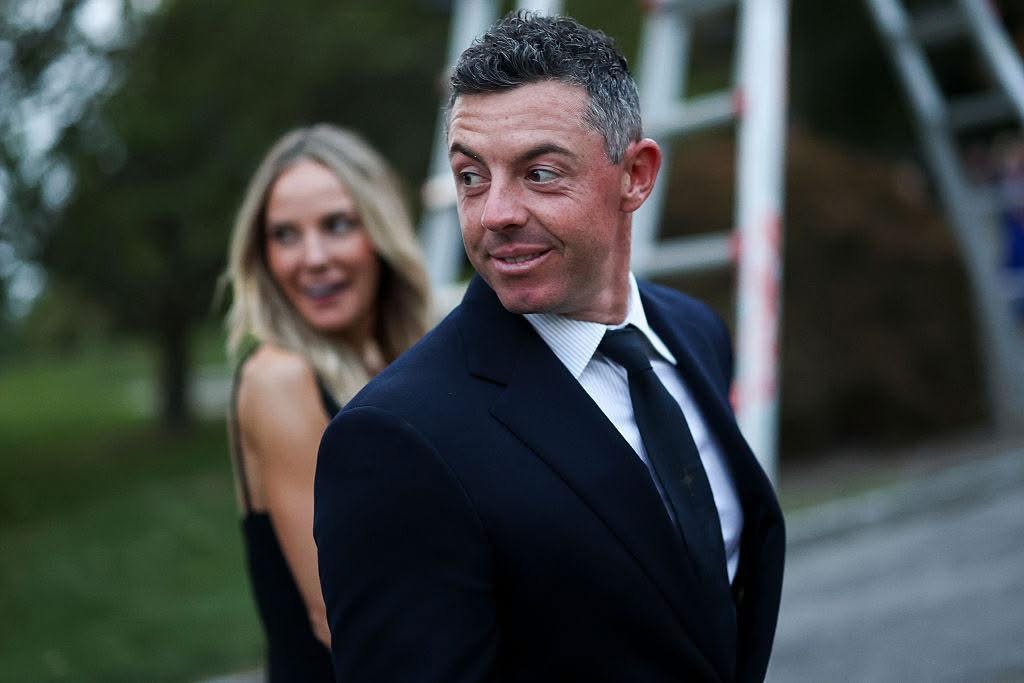The Ryder Cup has always been more than just golf. It’s a clash of cultures, a rivalry steeped in pride, and a contest that produces some of the sport’s most unforgettable moments. This year’s edition once again lived up to the hype, with Europe reclaiming the famous gold trophy in front of raucous home support. But as the cheers and champagne celebrations echoed across the fairways, one storyline cut through the jubilation: Paul Azinger’s sharp criticism of Rory McIlroy, accusing the Northern Irishman of “hypocritical behavior.”
Azinger, a former Ryder Cup-winning U.S. captain and one of golf’s most outspoken commentators, ignited debate in the aftermath of the tournament. He questioned whether McIlroy—who has often presented himself as a standard-bearer for sportsmanship and integrity—lived up to his own words when emotions boiled over during the tense Saturday evening session.
The Flashpoint
The controversy stemmed from McIlroy’s fiery exchanges with American players and their caddies during the pivotal fourball matches. A heated moment on the 18th green, followed by visible frustration in the car park afterwards, dominated headlines. Cameras caught McIlroy gesturing angrily and being ushered away by teammates, a rare public display of temper from one of the game’s biggest stars.
For many European fans, the outburst was seen as a symbol of his passion and commitment to the team cause. To them, McIlroy was standing up for Europe, showing fight in the face of American bravado. But to Azinger, it painted a different picture.
“Rory is a great champion, no one can deny that,” Azinger said during his post-Ryder Cup analysis. “But when you hold yourself up as the voice of respect and tradition, you’ve got to walk that line consistently. You can’t criticize the Americans for celebrating a certain way and then do the exact same thing. That’s where the hypocrisy comes in.”
Azinger’s Case Against McIlroy
Azinger’s critique centered on the idea of double standards. Over the years, McIlroy has spoken passionately about the importance of respect between competitors. He has condemned what he perceived as over-the-top celebrations from opponents and has often held himself out as an ambassador for golf’s traditions.
But in Azinger’s eyes, the Rory that showed up on Saturday evening was at odds with those principles.
“You can’t have it both ways,” Azinger explained. “If you’re going to demand respect, you’ve got to give it. And when you lose control, when you start pointing fingers and making a scene, it undermines everything you’ve preached about for years.”
His remarks sparked widespread debate across the golf community. Some agreed, suggesting that McIlroy’s car-park confrontation was a bad look, particularly given his stature in the game. Others argued that McIlroy’s behavior was no different than the fiery reactions often seen from American players, including Patrick Reed in Paris or Brooks Koepka and Bryson DeChambeau in past events.
McIlroy’s Defense
McIlroy himself was quick to defend his behavior when pressed about the incident. He emphasized that his emotions were fueled by loyalty to his teammates and the unique intensity of the Ryder Cup.
“The Ryder Cup isn’t like any other week,” McIlroy said. “You’re not just playing for yourself, you’re playing for your team, your continent, and your fans. Emotions run high. I’ll always stand up for what I believe is right, and sometimes that passion shows itself in ways it doesn’t during regular tournaments.”
He also pointed out that his frustration was aimed at the situation and not at fans or the competition itself, insisting he has “the utmost respect” for Team USA.
Passion vs. Sportsmanship
The Azinger-McIlroy dispute has reignited a long-running discussion about the fine line between passion and sportsmanship in the Ryder Cup. Unlike traditional stroke-play tournaments, the Ryder Cup thrives on emotion, confrontation, and drama. Players who are usually calm and reserved suddenly become fiery, vocal, and animated. It is part of what makes the competition so compelling.
Yet it also raises questions about limits. When does passion become disrespect? When do celebrations cross into antagonism? And does a player of McIlroy’s stature have an extra responsibility to stay composed, even when tensions flare?
Azinger clearly believes so. His argument rests on the idea that McIlroy, as a global ambassador for golf, has a duty to uphold the very values he champions. To him, losing control—even briefly—undermines that role.
Divided Reactions
The reaction among fans and fellow professionals has been sharply divided.
- Supporters of McIlroy argue that his behavior was no worse than the exuberant celebrations often displayed by Americans. They point to the “Boo Weekley horse-riding” incident in 2008 and Patrick Reed’s infamous shushing of the crowd in 2016 as evidence that McIlroy’s passion is simply part of the Ryder Cup’s DNA.
- Critics of McIlroy side with Azinger, insisting that consistency is key. They argue that you cannot preach respect while engaging in the same fiery antics you criticize in others.
Social media, as always, has been a battlefield of opinions, with clips of McIlroy’s car-park exchange being replayed and debated endlessly.
What It Means Going Forward
As the dust settles on another dramatic Ryder Cup, the Azinger-McIlroy debate is unlikely to disappear quickly. It raises larger questions about the expectations placed on the sport’s biggest stars and the standards they are held to.
For McIlroy, the criticism may sting, but it is unlikely to diminish his legacy or his passion for the Ryder Cup. He remains one of Europe’s emotional leaders, and his performances this year proved once again why he is so vital to the team.
For Azinger, his remarks continue a pattern of forthright commentary that has defined his post-playing career. Agree with him or not, his willingness to challenge golf’s biggest names ensures his voice remains central in the conversation.
What’s undeniable is that the Ryder Cup thrives on moments like this. The competition has always blurred the line between sportsmanship and showmanship, producing heroes and villains depending on which side of the Atlantic you cheer for.
In the end, McIlroy’s passion and Azinger’s criticism are just the latest chapter in that storied history—a reminder that the Ryder Cup is about far more than golf swings and scorecards. It’s about pride, emotion, and the fiery clashes that keep fans coming back every two years.










